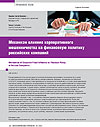Mechanism of Corporate Fraud Influence on Financial Policy of Russian Companies
The present article discusses the features of the corporate fraud and shocks influence on the capital structure of the company. Actions of Russian companies related to distortion of the accounting reports, implementation of deals with some interest (exceeding authority by the board of directors), sham transactions aimed at withdrawal of assets from the company (damage to the company and its shareholders), as well as obtaining unjustified tax benefit, contribute to financial restrictions and increase the lack of companies’ transparency. On the other hand, the impact of adverse market shocks makes Russian companies to focus on saving large amounts of money inside the company. In addition, the paper examines the effect of adverse shocks on changes in the debt policy of the company. Attention is drawn to the link between corporate fraud and financial policies of the company in view of adverse shocks impact on the sources of funding. Fraud causes the situation when Russian companies tend to save more money because of additional restrictions related to involving debt finance. Analysis results suggest that companies choose the internal source of financing as less expensive, following the hierarchical theory of optimal funding. The accumulated monetary reserves allow them to overcome at lower costs the effects of adverse shocks that determine financial instability. Corporate fraud and adverse shocks affect the company’s financial policy, forcing it to rely more on internal financing and to constantly increase its cash reserves, solving the problem associated with financial constraints.
References:
- Postanovlenie Prezidiuma Vysshego arbitrazhnogo suda Rossiyskoy Federatsii ot 6 marta 2012 g. no. 12505/11 [Resolution of the Presidium of the Supreme Arbitration Court of March 6, 2012 № 12505/11]. Vestnik VAS RF, 2012, no. 6.
- Opredelenie Moskovskogo gorodskogo suda ot 9 marta 2011 g. po delu no. 22-1730 [Determination of the Moscow City Court of March 9, 2011 on the Case № 22-1730]. Konsul’tantPlyus, available at: http://base.consultant.ru/cons/cgi/online.cgi?req=doc;base=SOJ;n=127732.
- Postanovlenie FAS Severo-Kavkazskogo okruga ot 17 avgusta 2012 g. po delu no. A32-47188/2009 [Resolution of the FAS North Caucasus Regional Office of 17 August 2012 on the Case № A32-47188/2009]. Konsul’tantPlyus, available at: http://base.consultant.ru/cons/cgi/online.cgi?req=doc;base=ASK;n=85321.
- Postanovlenie FAS Ural’skogo okruga ot 8 sentyabrya 2005 g. po delu no. A50-7476/04 [Resolution of the FAS Ural Regional Office of 8 September 2005 on the Case № A50-7476/04]. Konsul’tantPlyus, available at: http://base.consultant.ru/cons/cgi/online.cgi?req=doc;base=AUR;n=55541.
- Postanovlenie Evropeyskogo suda po pravam cheloveka ot 20 sentyabrya 2011 g. po delu “OAO Neftyanaya Kompaniya “Yukos” v. Russia” [Resolution of the European Court on Human Rights of 20 September 2011 on the Case of “OAO Neftyanaya Kompaniya “Yukos” v. Russia]. Rossiyskaya khronika Evropeyskogo suda, 2012, no. 3.
- Postanovlenie FAS Povolzhskogo okruga ot 22 aprelya 2013 g. no. A55-20302/2012 [Resolution of the FAS Volga Regional Office of April 22, 2013 № A55-20302/2012]. Konsul’tantPlyus, available at: http://base.consultant.ru/cons/cgi/online.cgi?req=doc;base=APV;n=112990.
- Postanovlenie FAS Severo-Zapadnogo okruga ot 1 fevralya 2012 g. no. A21-8937/2010 [Resolution of the FAS Northwestern Regional Office of February 1, 2012 № A21-8937/2010]. Konsul’tantPlyus, available at: http://base.consultant.ru/cons/cgi/online.cgi?req=doc;base=ASZ;n=129786.
- Postanovlenie Evropeyskogo suda po pravam cheloveka ot 22 yanvarya 2009 g. po delu “Bulves” AD v. Bulgaria [Resolution of the European Court on Human Rights of January 22, 2009 on the case “Bulves” AD v. Bulgaria”], available at: http://hudoc.echr.coe.int/sites/eng/Pages/search.aspx#{“fulltext”:[“bulves”],”itemid”:[“001-90792”]}.
- Karpoff J., Lee D., Martin G. The Cost to Firms of Cooking the Books. Journal of Financial and Quantitative Analysis, 2008, vol. 43, pp. 581–611.
- Lin C., Song F., Sun Z. Corporate Fraud, External Debt and Corporate Cash Policy. Working Paper. Chinese University of Hong Kong, 2013, pp. 1–45.
- Kreps D., Wilson R. Reputation and Imperfect Information. Journal of Economic Theory, 1982, vol. 27, pp. 253–279.
- Lutsenko S. Vliyanie peresmotra kreditnykh soglasheniy na finan-sovuyu politiku rossiyskikh kompaniy [Impact of the Credit Agreements Revision on the Financial Policy of the Russian Companies]. Finansovyy menedzhment, 2012, no. 1, pp. 53–59.
- Opler T., Pinkowitz L., Stulz R., Williamson R. The Determinants and Implications of Corporate Cash Holdings. Journal of Financial Economics, 1999, vol. 52, pp. 3–46.
- Harford J., Mansi S., Maxwell W. Corporate Governance and Firm Cash Holdings in the US. Journal of Financial Economics, 2008, vol. 87, pp. 535–555.
- Almeida H., Campello M., Weisbach M. The Cash Flow Sensitivity of Cash. Journal of Finance, 2004, vol. 59, pp. 1777–1804.
- Prikaz FNS Rossii ot 16 maya 2007 g. no. MM-3-06/308@ [Order of the FTS of Russia Dated May 16, 2007 № MM-3-06/308@]. Konsul’tantPlyus, Ekonomika i zhizn’, 2007, no. 23.
- RBK Quote, available at: http://quote.rbc.ru.
- Global Rates, available at: http//www.global-rates.com.
- Frank M., Goyal V. Capital structure decisions: Which factors are reliably important? Financial Management, 2009, vol. 38, pp. 1–37.
- 20. Leary M., Roberts M. Do firms rebalance their capital structures? Journal of Finance, 2005, vol. 60, pp. 2575–2619.



